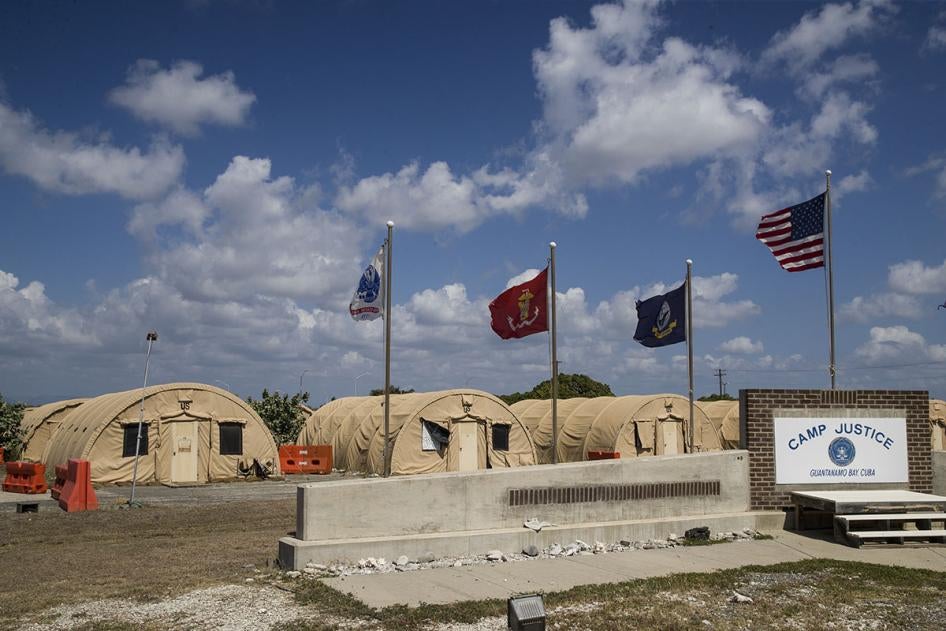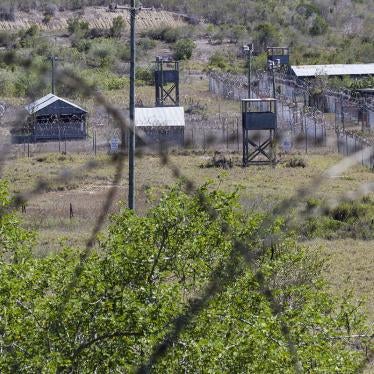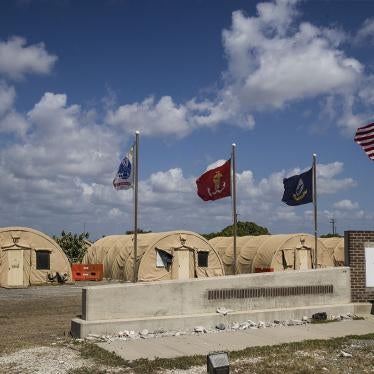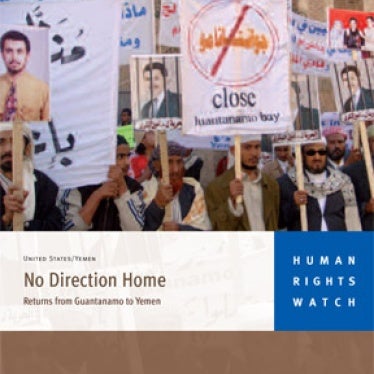As I sat behind the safety glass of a courtroom at Guantanamo Bay in mid-January, for the pre-trial hearings of the five men charged as conspirators in the Sept. 11, 2001, attacks, my mind kept wandering to a different prison, halfway around the world. Only the week before, Mustafa Kassem, a U.S. citizen, died in Egypt – where the government is a close U.S. ally – after more than six years of unjust detention and despite at least a degree of high-level rhetorical intervention from the United States.
Kassem’s death, apparently in part from complications from his hunger strike and denial of appropriate medical care, followed more than five years in pre-trial custody and then more than a year in prison, as a result of his sentencing in September 2018 to 15 years in a bogus trial. He was transferred to a hospital from Egypt’s Tora prison, which is notorious for medical neglect and torture. Though Kassem suffered from diabetes, heart disease, and hypothyroidism, he received negligent medical care.
For years, the United States has urged Egyptian officials to end torture, improve prison conditions, and release prisoners held for exercising their free speech rights, recommendations Egypt has ignored. Senior Trump administration officials also repeatedly asked the Egyptians to release Kassem, to no avail.
At Guantanamo, James Mitchell, the psychologist who designed and helped implement the CIA’s torture program with his partner, John Bruce Jessen, recently testified in public for the first time on his role in the program.
Though the five alleged 9/11 conspirators were charged more than seven years ago and have been held at secret CIA “black sites” or at Guantanamo since the early 2000s, their trial has not begun. The military commissions at Guantanamo don’t meet international fair trial standards and the process is mired in procedural chaos, but the delay seems to be driven by the torture that Mitchell and the CIA inflicted on the five men while they were held in black sites around the world. The destruction of those sites and of the evidence of what took place in them has made it harder for defense counsel to obtain evidence regarding the torture of their clients. That has been a key issue during pre-trial hearings on the admissibility of evidence obtained through torture.
Undermining the U.S. Government’s Ability to Keep Its Citizens Safe Abroad
That torture — and the failure of successive U.S. administrations to hold anyone accountable for the abuse – also stains and weakens American diplomacy to this day, impairing the ability of the U.S. government to keep its citizens safe abroad and to credibly promote respect for human rights in its foreign policy. Just last year, the chairman of the Xinjiang Uyghur Autonomous Region Government, Shohrat Zakir, criticized the passage of U.S. legislation calling for the closure of mass detention camps for Uighurs as hypocritical, comparing the conditions in the camps to those utilized by the United States at Guantanamo.
On the stand at Guantanamo, Mitchell recounted in graphic detail the techniques he and Jessen developed and used against detainees in CIA custody. But he wasn’t on trial and no one has yet been held accountable for the crimes he described; rather he was testifying as a witness.
As I listened to his descriptions of torture, my mind returned again to Mustafa Kassem. Conditions in Egyptian prisons, and in unofficial Egyptian detention centers are dire, and accountability is scarce. Since 2013, nearly 1,000 prisoners have died and, by some estimates, 136 of those deaths were caused by torture. In addition to Kassem’s death, Guilio Regeni, an Italian PhD student conducting research in Egypt, was abducted four years ago, then tortured to death. Egyptian authorities fabricated explanations for his death and refused to share evidence with Regeni’s family or Italian authorities that could implicate Egyptian security officials. No one has been held accountable.
Khaled Hassan, a dual U.S. and Egyptian citizen, is still in an Egyptian prison. He alleges that Egyptian security forces tortured him – including rape, electric shocks, and beatings – during the four months they forcibly disappeared him after picking him up.
Eerie Echoes
What stood out to me listening to Mitchell describe vividly the way he tortured the men sitting before him was the similarities between what the United States has done at its “black sites” and at Guantanamo, and the actions the United States cites in its criticism of Egypt. Mitchell described his use of waterboarding, a form of mock execution by near drowning; “walling,” a form of torture that involves wrapping a detainee’s neck with a towel and then repeatedly slamming them against a wall; and what the psychologist called “stress positions,” painful contortions of the body, often for extended periods of time. Egyptian security officials also use stress positions to coerce confessions from prisoners, similarly pairing their use with other torture tactics such as electric shocks and anal penetration.
Certainly, the U.S. failure to fully use its leverage in Egypt – including by imposing conditions on or suspending the nearly $1.5 billion in annual military aid – contributes to the Egyptian government’s dismissal of U.S. human rights concerns. But, even if that leverage were fully utilized, the hypocrisy would remain.
In the United States, neither Mitchell nor Jessen, nor any of the high-level U.S. officials responsible for approving and carrying out torture and other ill-treatment of detainees in the aftermath of 9/11 have been held accountable. Instead, people like Gina Haspel, who supervised a torture site, and Mike Pompeo, and Marshall Billingslea, who have advocated for interrogation methods that include torture, have been promoted to some of the highest positions within the Trump administration.
The United States will not be a credible voice against torture, prolonged arbitrary detention, and unfair trials when the very officials charged with that message also promoted such practices and have, to say the least, failed to condemn them at home. And Americans have largely forgotten that a prison even still exists at Guantanamo, in part because of the secrecy that plagues the military commissions: the hearings are not broadcast, and the transcripts are released weeks later, and, in the case of Mitchell’s testimony, include sections that were classified after the fact.
The American people can’t erase the history of the CIA torture program, or the last 18 years that these men and others at Guantanamo have spent in detention without trial. What Americans can do is truly reckon with its devastating effects. That means holding those who approved and carried out abuse accountable; transferring the military commissions cases to federal courts, where fair trials are possible; charge or release the 26 men who the United States asserts it can keep indefinitely at Guantanamo based on classified reviews; and release the five who have been cleared for release since the Obama administration.
To be sure, this administration has not been inclined to take any of these steps. Within days of entering office, Trump signed an executive order to keep Guantanamo open and vowed before his inauguration to “load [Guantanamo] up with some bad dudes.” But, should the next president be inclined to take these actions, maybe then the United States could be a more credible and effective voice abroad against torture and other detainee abuses.










